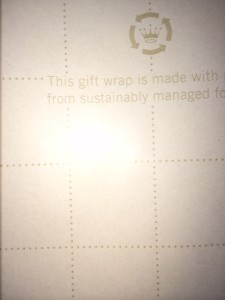Yesterday’s Quotation of the Day emphasized the reality that most of the innovations that contribute to the enormous prosperity of the masses who enjoy the good fortune to live in modern, market-oriented societies are small – each one so tiny that it is overlooked. But just as the ocean is made up of countless tiny drops of water, the oceanic prosperity that we today enjoy is made up of countless, mostly tiny drops of innovation.
Here’s an example that I noticed this morning: it’s grid-lines on the back of Christmas wrapping paper. (The gift-wrapping paper the back of which is pictured here was purchased at a local supermarket – Giant – in the D.C. metro area. It’s not high-end stuff.) Such lines make it easier to cut the paper in straight lines. These lines also diminish the prospect of errors in cutting the paper – and, thus, conserve paper by lowering the likelihood that each particular bit of wrapping paper will have to be discarded because it was cut so badly that it no longer serves to make an attractive wrapping for a gift.

I’m unsure just when such grid-lines became available on wrapping paper, but I’m quite sure that I never saw them in the 1970s (the decade in which, according to so many claims, middle-class Americans’ living standards reached its peak and never as yet to be exceeded).
Of course it’s true that if all gift-wrapping paper lost these grid-lines the resulting reduction in Americans’ living standards would be barely noticeable, even by ordinary Americans who every year wrap gifts during the holidays and on other gift-giving occasions. This reduction would certainly be undetectable in any of the data that are used to measure economic activity and to gauge changes over time in that activity. Yet to conclude from this undetectability that innovations such as these grid-lines do not improve ordinary-people’s standard of living is equivalent to concluding that the Pacific ocean is not made up of countless tiny drops of water.



